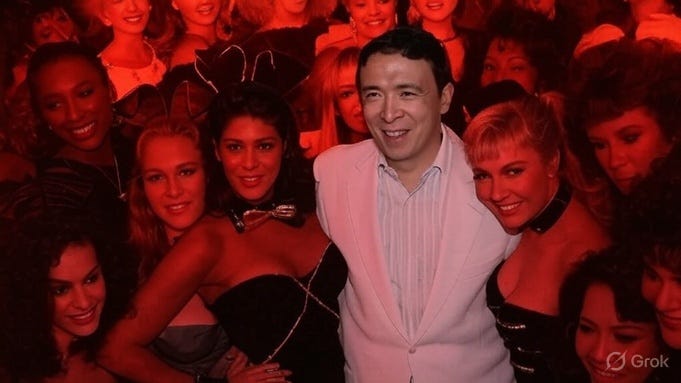Moonlight Reflected
Women who yang and men who yin don't need my advice, but they need to commit to the bit
I’m very proud of Navigation by Moonlight, and not just because it got a warm reception and resonated with many readers. I’m proud because I didn’t understand it well enough to write about even six months ago. Which, coincidentally, is when I submitted Second Person as a book proposal. Thankfully, my book agent gave up on me and a friend convinced me to start a Substack instead. I’m grateful to both!
Writing a Substack on some topic is the best way to actually learn and understand that topic. People hear what I do and rush to share their ideas about dating, their personal stories, their book recommendations. And, naturally, their critical feedback on my posts.
I won’t rehash my disagreements with feedback in mainline posts, but it’s worth following up on two points that came up repeatedly:
That by encouraging yin I’m giving bad advice.
That I’m ignoring all the women who date with yang and the men who yin.
#1 is completely wrong — I’m giving no advice at all. What I’m trying to encourage is understanding: of the approaches available to you, and of the approaches taken by the people you’re trying to date. And in this pursuit of understanding, I want to explore #2: what works and doesn’t work when women adopt a more proactive approach and men seek to yin?
After all, that’s what I’m doing myself.
Reverse Advice
The chapter on why I refrain from giving unambiguous instruction can be summarized in three words: dating is anti-inductive. There is no alpha in generic “dateability” advice, and nothing I could instruct without knowing you that would reliably help you. Even if the advice I gave was right for you, there’s some reason you’re not already doing it that won’t disappear because you read it in one more blog.
In fact, it’s even worse for general advice givers: the advice that filters to a reader without being personally tailored to them is more likely to be the opposite of what they need to hear:
When a young person is looking for job advice, I worry that all the artsy creative people whose heads are already way too high in the skies will be reading books by artsy creative people who urge them to follow their dreams, and so be even less mindful of the importance of a secure future. And all the hard-headed down-to-earth people will naturally gravitate toward reading Have A Very Secure Future By Going Into Business by Warren Buffett, and maybe never get reminded of the importance of following dreams. […]
I wonder whether everyone would be better off if they automatically reversed any tempting advice that they heard (except feedback directed at them personally). Whenever they read an inspirational figure saying “take more risks”, they interpret it as “I seem to be looking for advice telling me to take more risks; that fact itself means I am probably risk-seeking and need to be more careful”. Whenever they read someone telling them about the obesity crisis, they interpret it as “I seem to be in a very health-conscious community; maybe I should worry about my weight less.”
— Scott Alexander, Should You Reverse any Advice You Hear?
In the last post, I quoted Wesley Fenza’s explicit advice for women to “just ask people out.” I don’t think this is wrong advice for women in general, or that Wesley is wrong that there has been a lot of pressure historically on women to conform to a passive, feminine role. But I’m pretty sure this advice isn’t something that Wesley’s own female readers are much in need of.
Wesley is polyamorous, rationalist, liberal, and educated (as am I). His other readers undoubtedly skew towards these as well (as do mine). And all four of these already strongly nudge women towards a more yang approach to dating.
Liberalism and education are allied with feminism, the kind that celebrates women who step into historically male roles whether it be a CEO or alien-punching superhero. Conservatives do still try to stuff women into traditional gender boxes, but that only causes liberal and educated people to toss these boxes out without examination. Eneasz Brodski describes how growing up in a liberal city he didn’t believe that men were physically stronger than women — there wasn’t enough non-fictional evidence to contradict popular fiction and the popular desire to not be like those sexist rubes.
To be clear, I reject the trad caricature of gender roles as well. I never argue that women must be coy and receptive because God ordained it or because civilization depends on it. I try to explain yin on its own terms, not as an imposition from the outside.
I touched on how yang-oriented rationalism is, to the point where rationalists often take it to be a core virtue in itself and yin a vice. Even aside from the general message, rationalist women are nudged towards taking the reins simply by how rationalist men are.
Nerdy, tism-adjacent men are famous for being bad at picking up subtle cues and for overall timidity around women. The two go hand-in-hand: if a guy doesn’t trust his ability to read what a woman wants he will hesitate to make a move. This hesitation is compounded by facing social risk in the one social group where he feels comfortable, a group where women are rare and more valued than men. With the yang role vacated by men, rationalist women step into it whether with enthusiasm or reluctace.
And as for polyamory — we’ll get to that in a bit.
Perhaps some women really need to hear that asking men out is an option, but then again some already feel uncomfortably pressured to do so. My own female readers felt seen and validated by my essay, but not because I was advising them to be more yin than they already are or less so. And my advice to men was: try to understand where women are coming from instead of judging them, especially if you plan to date any.
And with that, let’s try to understand where yang women and yin men are coming from. And, more importantly, where they’re going.
Yang’s Girls
The core driver of the classic gendered pattern are each gender’s basic desires. For women: to feel special and uniquely devoted to. For men: to feel capable and admired for their actions. Different men and women feel these to a different extent, but the difference doesn’t come from the blog posts they read. These come from a much deeper place than mere cultural programming.
The starting point for going against the classic pattern is understanding what you’re giving up. For yang women: giving up the some power to select men for special devotion, and for yin men: to prove themselves. The question is whether this sacrifice is worth it, and what is gained instead.
Keep reading with a 7-day free trial
Subscribe to Second Person to keep reading this post and get 7 days of free access to the full post archives.






